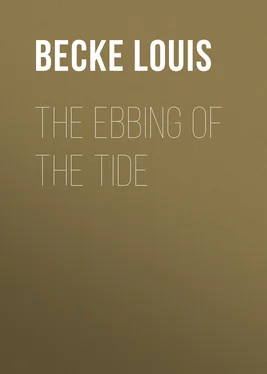Louis Becke - The Ebbing Of The Tide
Здесь есть возможность читать онлайн «Louis Becke - The Ebbing Of The Tide» — ознакомительный отрывок электронной книги совершенно бесплатно, а после прочтения отрывка купить полную версию. В некоторых случаях можно слушать аудио, скачать через торрент в формате fb2 и присутствует краткое содержание. Жанр: foreign_prose, literature_19, foreign_antique, на английском языке. Описание произведения, (предисловие) а так же отзывы посетителей доступны на портале библиотеки ЛибКат.
- Название:The Ebbing Of The Tide
- Автор:
- Жанр:
- Год:неизвестен
- ISBN:нет данных
- Рейтинг книги:5 / 5. Голосов: 1
-
Избранное:Добавить в избранное
- Отзывы:
-
Ваша оценка:
- 100
- 1
- 2
- 3
- 4
- 5
The Ebbing Of The Tide: краткое содержание, описание и аннотация
Предлагаем к чтению аннотацию, описание, краткое содержание или предисловие (зависит от того, что написал сам автор книги «The Ebbing Of The Tide»). Если вы не нашли необходимую информацию о книге — напишите в комментариях, мы постараемся отыскать её.
The Ebbing Of The Tide — читать онлайн ознакомительный отрывок
Ниже представлен текст книги, разбитый по страницам. Система сохранения места последней прочитанной страницы, позволяет с удобством читать онлайн бесплатно книгу «The Ebbing Of The Tide», без необходимости каждый раз заново искать на чём Вы остановились. Поставьте закладку, и сможете в любой момент перейти на страницу, на которой закончили чтение.
Интервал:
Закладка:
So the captain gave him five muskets and plenty of powder and bullets, and then said—
“See, Sralik; I will give you a white man too, to show you how to shoot your enemies.”
And then he laughed, and calling out to a man named Harry, he told him to clear out of the ship and go and live ashore and be a king, as he was not worth his salt as a boatsteerer.
And so this Harry Devine, who was a drunken, good-for-nothing, quarrelsome young American, came ashore with Sralik, and next day he loaded the five muskets and, with Sralik, led the Pingelap people over to Tugulu. There was a great fight, and as fast as Sralik loaded a musket, Harry fired it and killed a man. At last, when nearly thirty had been shot, the Tugulu people called for quarter.
“Get thee together on Takai,” called out Sralik, “and then will we talk of peace.”
Now Takai is such a tiny little spot, that Sralik knew he would have them at his mercy, for not one of them had a musket.
As soon as the last of the Tugulu people had crossed the shallow channel that divides Tugulu from Takai, the cunning Sralik with his warriors lined the beach and then called to the Tugulans—
“This land is too small for so many.”
And then Harry, once the boatsteerer and now the beachcomber, fired his muskets into the thick, surging mass of humanity on the little ‘islet, and every shot told. Many of them, throwing aside their spears and clubs, sprang into the water and tried to swim over to Pingelap across the lagoon. But Sralik’s men pursued them in canoes and clubbed and speared them as they swam; and some that escaped death by club or spear, were rent in pieces by the sharks which, as soon as they smelt the blood of the dead and dying men that sank in the quiet waters of the lagoon, swarmed in through a passage in the western reef. By and by the last of those who took to the water were killed, and only some eighty or ninety men and many more women and children were left on Takai, and the five muskets became so hot and foul that Harry could murder no longer, and his arm was tired out with slaughter.
All that night Sralik’s warriors watched to see that none escaped, and at dawn the hideous massacre began again, and club, spear, and musket did their fell work till only the women and children were left. These were spared. Among them was Ninia, the wife of Sikra, the chief of Tugulu. And because she was young and fairer than any of the others, the white man asked her of Sralik for his wife. Sralik laughed.
“Take her, O clever white marn—her and as many more as thou carest for slaves. Only thou and I shall rule here now in this my island.”
So Harry took her and married her according to native custom, and Ninia was his one wife for nearly fifteen years, when one day he was quietly murdered as he lay asleep in his house with his wife and two children; and although Sralik wept loudly and cut his great chest with a shark’s teeth dagger, and offered sacrifices of turtle flesh to the white man’s jelin , Ninia his wife and many other people knew that it was by Sralik’s orders that Harry had been killed, for they had quarrelled over the possession of a whaleboat which Harry had bought from a passing ship, and which he refused to either sell or give to Sralik.
However, Sralik was not unkind to Ninia, and gave her much of her dead husband’s property, and told her that he would give her for an inheritance for her two daughters the little islet—Takai.
And there in the year 1870 Ninia the widow, and Ninia her eldest daughter (for on Pingelap names of the first-born are hereditary) and Tarita, the youngest, went to live. With them went another girl, a granddaughter of the savage old Sralik. Her name was Ruvani. She was about eleven years of age, and as pretty as a gazelle, and because of her great friendship for Ninia—who was two years older than she—she had wept when she saw the mother and daughters set out for Takai.
Fierce-hearted Sralik coming to the doorway of his thatched hut heard the sound of weeping, and looking out he saw Ruvani sitting under the shade of some banana trees with her face hidden in her pretty brown hands.
When he learned the cause of her grief his heart softened, and drawing his little grand-daughter to him, patted her head, and said—
“Nay, weep not, little bird. Thou too shalt go to Takai; and see, because of thee my heart shall open wide to Ninia and her daughters, and I will give her four slaves—two men and two women—who shall toil for you all. And when thou art tired of living at Takai, then thou and thy two playmates shall come over here to me and fill my house with the light of thy eyes.”
So that is how Ninia, the widow of the wandering white man, and her two daughters and their friend came to live at the little islet called Takai.
II
The months went by and Ruvani, the chief’s granddaughter, still lived with her friends, for she was too happy to leave them. Sometimes, though, on bright moonlight nights, the three girls would paddle across to the big village and gather with the rest of the village girls in front of the chiefs house, and dance and sing and play the game called n’jiajia ; and then, perhaps, instead of going home across the lagoon in the canoe, they would walk around on the inner beaches of Pingelap and Tugulu. And long ere they came to the house they could see the faint glimmer of the fire within, beside which Ninia the widow slept awaiting their return.
Stealing softly in, the girls would lie down together on a soft white mat embroidered with parrots’ feathers that formed their bed, and pulling another and larger one over them for a coverlet, they would fall asleep, undisturbed by the loud, hoarse notes of a flock of katafa (frigate birds) that every night settled on the boughs of a great koa tree whose branches overhung the house.
Sometimes when the trade-winds had dropped, and the great ocean rollers would beat heavily upon the far-off shelves of the outer reef, the little island would seem to shake and quiver to its very foundations, and now and then as a huge wave would curl slowly over and break with a noise like a thunder-peal, the frigate-birds would awake from their sleep and utter a solemn answering squawk, and the three girls nestling closer together would whisper—
“‘Tis Nanawit, the Cave-god, making another cave.”
Ere the red sun shot out from the ocean the eight dwellers on Takai would rise from their mats; and whilst Ninia the widow would kindle a fire of broken cocoanut shells, the two men slaves would go out and bring back young cocoanuts and taro from the plantation on Tugulu, and their wives would take off their gaily-coloured grass-girdles and tie coarse nairiris of cocoanut fibre around them instead, and with the three girls go out to the deep pools on the reef and catch fish. Sometimes they would surprise a turtle in one of the pools, and, diving in after the frightened creature, would capture and bring it home in triumph to Ninia the widow.
Such was the daily life of those who dwelt on Takai.
One day, ere the dews of the night had vanished from the lofty plumes of the cocoanut palms, there came to them a loud cry, borne across the waters of the silent lagoon, over from the village—
“A ship! A ship!”
Now not many ships came to Pingelap—perhaps now and then some wandering sperm-whaler, cruising lazily along toward the distant Pelew Islands, would heave-to and send a boat ashore to trade for turtle and young drinking cocoanuts. But it was long since any whaleship had called, and Ninia the widow, as she looked out seawards for the ship, said to the girls—
“‘Tis not yet the season for the whaleships; four moons more and we may see one. I know not what other ships would come here.”
Читать дальшеИнтервал:
Закладка:
Похожие книги на «The Ebbing Of The Tide»
Представляем Вашему вниманию похожие книги на «The Ebbing Of The Tide» списком для выбора. Мы отобрали схожую по названию и смыслу литературу в надежде предоставить читателям больше вариантов отыскать новые, интересные, ещё непрочитанные произведения.
Обсуждение, отзывы о книге «The Ebbing Of The Tide» и просто собственные мнения читателей. Оставьте ваши комментарии, напишите, что Вы думаете о произведении, его смысле или главных героях. Укажите что конкретно понравилось, а что нет, и почему Вы так считаете.












